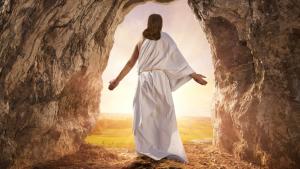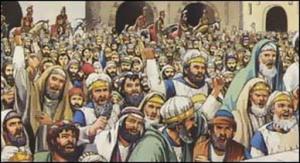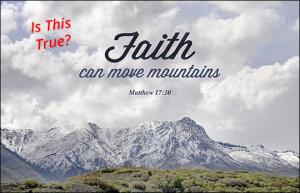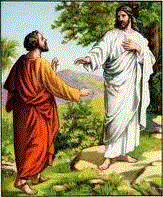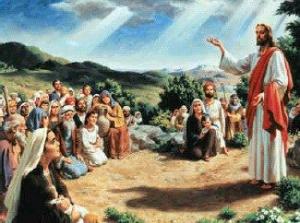
It was in the middle of a plain, or was it on a mountain? It started with what we call the Beatitudes, and it was a great speech. Or was it an editor’s gathering of things Jesus said on many separate occasions?
The story appears in Matthew and Luke, both of whom relied on an earlier source now lost. Matthew is the one who gives us the “Sermon on the Mountain.” The mountain makes us think of Jesus as the fulfillment of the law, the new Moses. As Moses receives the Law from God on a mountain in the Exodus story, so — in Matthew — Jesus gives the new Law on a mountain. Luke, perhaps less theologically motivated in this instance than Matthew, gives us a sermon on a plain.
Beatitudes in two versions
The Beatitudes, which start the sermon, wherever it occurred, comprise one of the more misunderstood—or decisively reinterpreted—teachings of Jesus. To understand what Jesus meant by the Beatitudes, it’s necessary to find out what he actually, probably, said. The two versions are very different. Here is Matthew’s version, followed by Luke’s (the numbers, of course, are not in the original):
Matthew
- Blessed are the poor in spirit, for theirs is the kingdom of heaven.
- Blessed are they who mourn, for they will be comforted.
- Blessed are the meek, for they will inherit the land.
- Blessed are they who hunger and thirst for righteousness, for they will be satisfied.
- Blessed are the merciful, for they will be shown mercy.
- Blessed are the clean of heart, for they will see God.
- Blessed are the peacemakers, for they will be called children of God.
- Blessed are they who are persecuted for the sake of righteousness, for theirs is the kingdom of heaven. Blessed are you when they insult you and persecute you and utter every kind of evil against you (falsely) because of me. Rejoice and be glad, for your reward will be great in heaven. Thus they persecuted the prophets who were before you. (Matthew 5: 3-12)
Luke
- Blessed are you who are poor, for the kingdom of God is yours.
- Blessed are you who are now hungry, for you will be satisfied.
- Blessed are you who are now weeping, for you will laugh.
- Blessed are you when people hate you, and when they exclude and insult you, and denounce your name as evil on account of the Son of Man. Rejoice and leap for joy on that day! Behold, your reward will be great in heaven. For their ancestors treated the prophets in the same way. (Luke 6:20-23)
The new law or something else
People often think of the Beatitudes as Jesus’ addition to and improvement on the 10 Commandments of Moses. They show us how to live in ways that go beyond the ‘Thou shalt not’s of the Mosaic Law. This interpretation comes naturally from Matthew’s version of what Jesus said. For six of the eight Beatitudes, Matthew’s are all actions or attitudes that we can choose—new laws we can follow. No matter how rich or poor you are, you can be poor “in spirit.” You can be meek and mild mannered, if you try. You can have hope that the right will triumph, extend mercy to others, avoid the distractions that turn your heart away from your true purpose in life, work for peace.
Luke’s version of the Beatitudes is a lot shorter. None of Luke’s Beatitudes are things that a person does or controls. Here Jesus isn’t adding to the commandments, giving prescriptions for how to live or telling us to shape up our attitudes. He’s not telling rich people to be poor in spirit and not even talking to rich people. He’s addressing very intimately “you who are poor.” His concern is just the practical situation of life for most of the people in his audience.
In this sermon there’s no metaphorical hunger for righteousness. Jesus’ audience consists of people who literally don’t have enough to eat. There are people who are not just mourning (Matthew’s word) but weeping. And Jesus describes the situation of every poor person in Judea and Galilee with “when people hate you, and when they exclude and insult you.” Jesus’ listeners were overwhelmingly, even if not entirely, from among those who were poor; but this last saying indicates the situation of any of his followers (and his own situation). People will “denounce your name as evil on account of the Son of Man.” That is, they will consider you a heretic. And Jesus calls these people blessed.
Jesus’ poverty, and God’s?
Most scholars think Luke has the more accurate rendering of Jesus’ words. Matthew reinterprets. That’s not to say there’s something wrong with Matthew’s version. It’s a beautiful and justly loved statement of what the ideal Christian life is like. I think Jesus would agree with all of it. But Jesus was actually talking about the reality of the lives of the people in front of him, and his own life as well. For Jesus the poor are “we.” And “We” are blessed. Jesus was poor.
I’m accustomed to saying “Jesus is God.” It’s a statement that seems to be about Jesus, but it’s odd. “Jesus” is the subject, and “God,” the predicate, is expected to help me understand something about Jesus. But God is what I understand least of all. When I try to apply what I seem to understand about God, things like omnipotence, omniscience, impassibility, etc., it doesn’t work. Jesus doesn’t seem like any of those things. “Jesus is God” works best backwards. I do know quite a bit about Jesus. For believers Jesus is the one who helps understand God.
And Jesus was poor. What does that fact about Jesus tell me about God? God’s poverty consists in God’s giving his very self away, first to the Son, then to the world God creates. I imagine it’s a true gift, not calculated on getting something back. Jesus imitates this original poverty:
For you know the grace of our Lord Jesus Christ, that though he was rich, yet for your sake he became poor, so that you through his poverty might become rich. (2 Corinthians 8:9)
Then Matthew is on the right track, after all. The very first blessedness is being “poor in spirit.”
Image credit: Mike’s Place on the Web via Google Images



